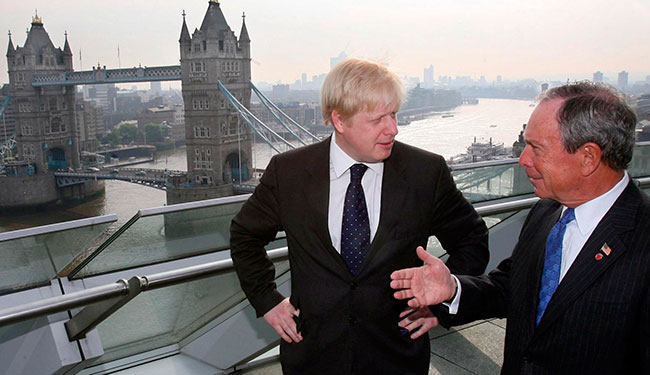Can and should global cities have their own foreign policy? This question was hotly debated at last year’s Chicago Forum on Global Cities and has been frequently raised in other settings.
The idea exposes a friction between long-held notions about the respective role of cities and nation-states within the international system. After all, aren’t cities legally subordinate to states, embedded within the national territory? As the sovereign authority, isn’t the state supposed to be unchallenged in the realm of foreign affairs? That this idea has become an issue for debate reveals a changing world—traditional thinking about international politics is being destabilized.

Yet this question is less strange than it might have been in the past due to a number of significant developments.
Firstly, in the last four decades cities have grown immensely in size and significance. Concentrated onto just two percent of the world’s surface, great urban hubs now hold half of the world’s population; a figure set to push toward 85 percent by the century’s end. Moreover, some mega-cities have merged to form global city regions with a size and reach that dwarfs many states.
Hong Kong-Shenzhen-Guangzhou has around 120 million people, Tokyo-Osaka-Kyoto-Kobe may have 60 million, Sao Paulo-Rio de Janeiro 40 million. At the same time, global city regions often traverse state territorial boundaries: Take, for example, Europe’s ‘Blue Banana’ region, pivoting on a Manchester-Milan axis, and incorporating an urban population of 110 million. And technologically connected global city networks further destabilize existing understandings of territorial boundaries and generate novel transnational social connections. Such global city regions and networks drive global economic productivity, creativity, and innovation. They offer critical command and control capability for a decentralised global economy. They struggle with many of the most pressing social, environmental, and security problems. But, they also offer a vast reservoir of intellectual power for generating solutions to such problems.
From our partners:
Secondly, cities are increasingly disillusioned with the failure of state diplomacy to resolve transnational issues that affect them directly.
Where the structure of international society increasingly seems to pose obstacles to effective state based global governance, cities are taking action by developing a parallel global governance architecture. Nowhere is state failure more apparent than in the outcomes of climate change summit diplomacy over recent decades. But hopes now attach to other forums. Cities are represented at the COP21 2015 Paris Climate Convention by former New York Mayor Michael Bloomberg who serves as the UN Secretary General’s Special Envoy for Cities and Climate Change. And states, cities, and many other actors will come together at UN-HABITAT III (Ecuador 2016) to sketch an agenda for a 20-year strategy of sustainable, equitable and socially just urban development.
Thirdly and relatedly, a combination of an emerging system of neoliberal global governance and advances in information and communications technology in the last few decades have enabled an accelerating trend toward decentralized city-to-city networking.
Voluntary and informal cooperation now occur across the 200 city networks that have been built—of which the C40 Climate Leadership Group, Metropolis, and the International Council for Local Environmental Initiatives are but the tip of a huge iceberg. Although city diplomacy has a longer lineage, it is in these recent developments that we begin to see the potential for cities to have a real impact on global governance outcomes, even when states fail to act. For example, the C40 is using its augmented capacity for global reach to generate climate mitigation strategies across its network of over 80 major metropolises. It engages in strategic partnerships with a number of private actors, such as the Clinton Foundation’s Climate Change Initiative and multinational corporations, as well as the United Nations and the World Bank. C40 strategy takes the shape of collective action, developing strategies for coordination across the network. These include sharing best practice models and technical know-how in areas such as transportation, energy, and waste infrastructures, and retrofitting projects. These initiatives represent a two-pronged approach to governance: engaging with national and international forums, but also developing a parallel, self-organising track that bypasses traditional hierarchical state dominated channels.
So a foreign policy for cities in the 21st century will not look like the kind of foreign policy that states have. Cities are not ready, or even willing, to try to challenge or replace states in this regard. City incursions into global politics reflect instead the growing centrality of cities to an emerging regime of complex global governance beyond the state. Such governance is different from the hierarchical form of political order that underpins the state. It is based much more on horizontal interaction between multiple agencies in civil society. In this regime global cities have a form of network power that resides in their ability to shape agendas, foster transnational collaboration, and bring together a wide variety of actors in civil society to tackle transnational issues of common concern. The emergence of this system of global governance is one that states themselves have helped to build, both through their policies and their failures. The challenge placed before cities is to decide how they want to shape this regime, and what values they want to embed within it.
There is a further issue to reflect upon here. While these developments may not be pushing cities to directly challenge states, they do pose significant challenges to the traditional understandings of sovereignty, territoriality, authority, and legitimacy that underpin the contemporary international system. It is these challenges that make raising the question of a foreign policy for cities important. The very question brings to our attention the paradoxes and tensions that structure global politics today. Global cities are at the forefront of an emerging global order. They will play a critical part in shaping its future development.
This article originally appeared in The Chicago Council.


















